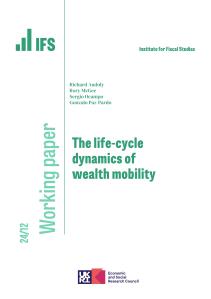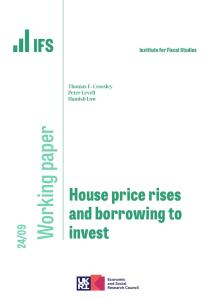Fiscal Studies Special Issue on a Wealth Tax: Time for Another Look?
Around the world, proposals for new taxes on the stock of wealth (a ‘wealth tax’) were gaining traction even before the fiscal tumult that has followed the COVID-19 pandemic. Piketty's ‘utopian ideal’ of a global wealth tax is perhaps the most prominent example.1 In the US, a new wealth tax proposed by Saez and Zucman (2019) was taken up by prominent candidates for the 2019 Democratic primaries. The OECD recently conducted a wide-ranging review of the wealth taxes already in operation within its member countries,2 and new empirical research has also examined the impacts of existing wealth taxes in a developing country context.3
The COVID-19 crisis has accelerated this interest in wealth taxes. First off the mark was Argentina, which in December 2020 passed a new one-off levy on its wealthiest citizens (with assets over $2.5 million) to pay for medical supplies and relief measures.4 In April 2021, in response to concerns about a $5 trillion surge in the wealth of the world's richest individuals during the pandemic, the UN Secretary-General urged governments to consider introducing a new ‘solidarity or wealth tax’.5 The International Monetary Fund has also recommended that countries consider taxes on high wealth, emphasising the ‘symbolic impact of this type of contribution’ in the context of recovery from the COVID-19 crisis.6
These developments follow several decades in which taxes on the stock of wealth were almost entirely off the global political agenda. In fact, starting in the 1990s, many of the countries that already had an annual wealth tax, decided to abolish them.7 These examples have fed a narrative that whilst wealth taxes may be popular with the public in principle, they cannot be made to work in practice. Only three countries within the OECD still have an annual wealth tax: Norway, Spain and Switzerland. The design of the tax in each of these countries differs quite significantly, although none operates the high-threshold broad-based approach that has been advocated by Piketty, Saez, Zucman and others of late.
In the UK, it has been nearly half a century since proposals for a wealth tax were last seriously evaluated. In the aftermath of World War II, Nicholas Kaldor recommended imposing an annual wealth tax as a replacement for the income ‘surtax’.8 Kaldor later served on the Royal Commission on Taxation 1951–55, which rejected the idea of a wealth tax, together with Kaldor's better-known proposals for an expenditure tax.9 The Labour Party promised to introduce an annual wealth tax in their 1974 manifesto and issued a Green Paper once in government.10 These plans attracted criticism from the newly formed Institute for Fiscal Studies, amongst others.11 Following doubts by Treasury officials and staunch opposition from external groups,12 Labour's plans for a wealth tax were finally shelved in 1976.
The Meade Report,13 published by the IFS in 1978, favoured an annual tax on the stock of wealth to supplement a system of broad-based taxes on consumption. The panel's rationale was that:
‘wealth gives opportunity, security, social power, influence and independence. For this reason it may be argued that, however well a system of taxation of income or of consumption may be devised, equity requires that wealth itself should be included in the base for progressive taxation.’
Despite making the ‘in-principle’ case for a wealth tax, the Meade Report did not develop a specific proposal and the idea was not taken any further. In the 30 years that followed, through the 1980s up until the global financial crisis of 2007–08, one can find hardly anything at all written about the idea of introducing an annual wealth tax in the UK. The contributors to the Mirrlees Review, published in 2011, briefly considered a regular wealth tax, but only to reject it.14 The review proceeded – unlike the Meade Report – on the basis that the only benefit individuals receive from holding wealth comes from the consumption (by the individual or whoever the wealth is passed on to) that the wealth can finance.15 In rejecting an annual wealth tax, the review also cited practical difficulties and poor international experience: ‘[i]t is costly to administer, might raise little revenue, and could operate unfairly and inefficiently’.16
This potted history discloses two important reasons for refreshing thinking on a wealth tax. First, the in-principle case for a wealth tax remains contingent and contested. The issue that divided the Meade Report and the Mirrlees Review is still live. Second, the question of whether and how a wealth tax could work in practice in the UK has received hardly any attention since the 1970s. In the intervening period, the UK's economic circumstances have changed significantly, and so has the landscape of tax administration. As other countries have introduced – and, in many cases, abandoned – a wealth tax, more evidence has also become available from which to draw comparisons and learn lessons. For both of these reasons, it is wise to draw on the ‘state of the art’ rather than relying on old tropes.
There is also a third reason for reinvigorating debates about a wealth tax now, in the aftermath of the COVID-19 pandemic. Countries around the world are facing huge pressures on their public finances. These result not only from the increased public spending and reduced tax base during the acute phase of the pandemic, but also from calls for sustainably higher spending in domains where the cracks have grown largest, such as in health, social care and education. These circumstances provide a renewed urgency to ‘think big’ on tax policy and to treat seriously, albeit with due scrutiny, options that were previously considered off the table. The lack of a robust and up-to-date evidence base on wealth taxes risks leaving policymakers unprepared for this critical debate.
This special issue draws together the latest thinking on wealth taxes with the aim of filling this gap. It draws heavily on international experience and evidence, applying these insights to the UK context. The papers build on work undertaken for the Wealth Tax Commission, which delivered its final report in December 2020.17 The contributors to this special issue include tax practitioners and academic lawyers as well as economists, reflecting our view that this range of expertise is essential to evaluating the practice, as well as principles, of a wealth tax. In the following section, we briefly touch upon some common themes arising across the papers. We also highlight some important remaining gaps in the evidence base on wealth taxes, particularly on the measurement of wealth and behavioural responses at the very top of the wealth distribution.











